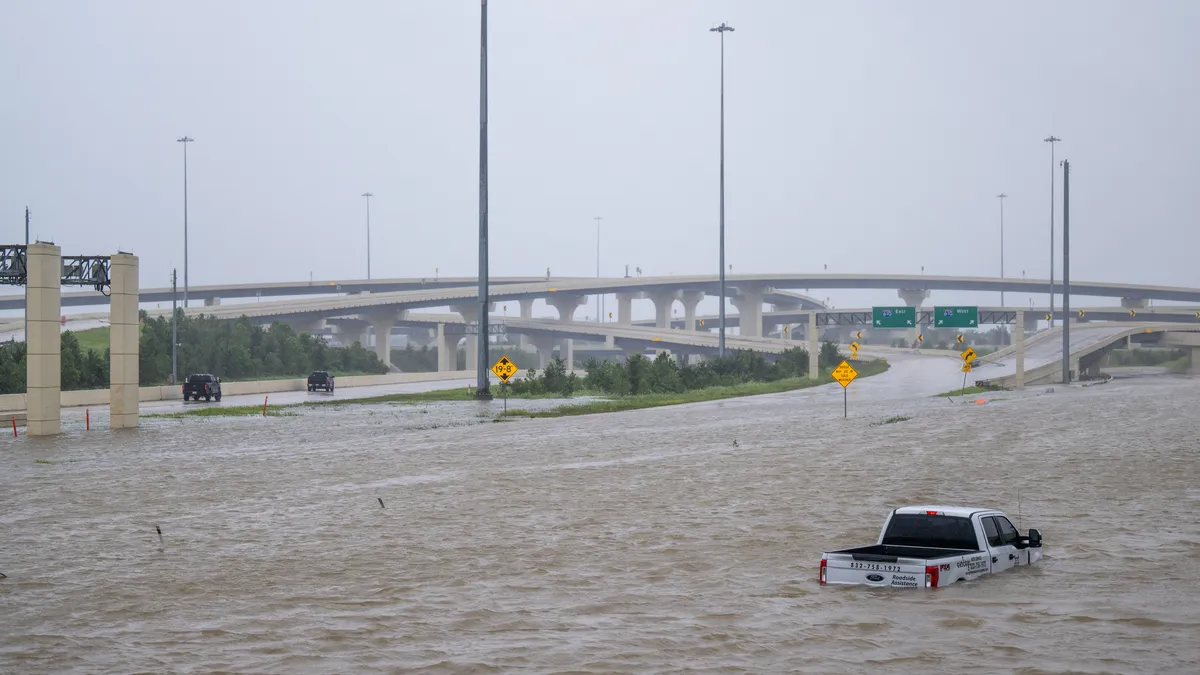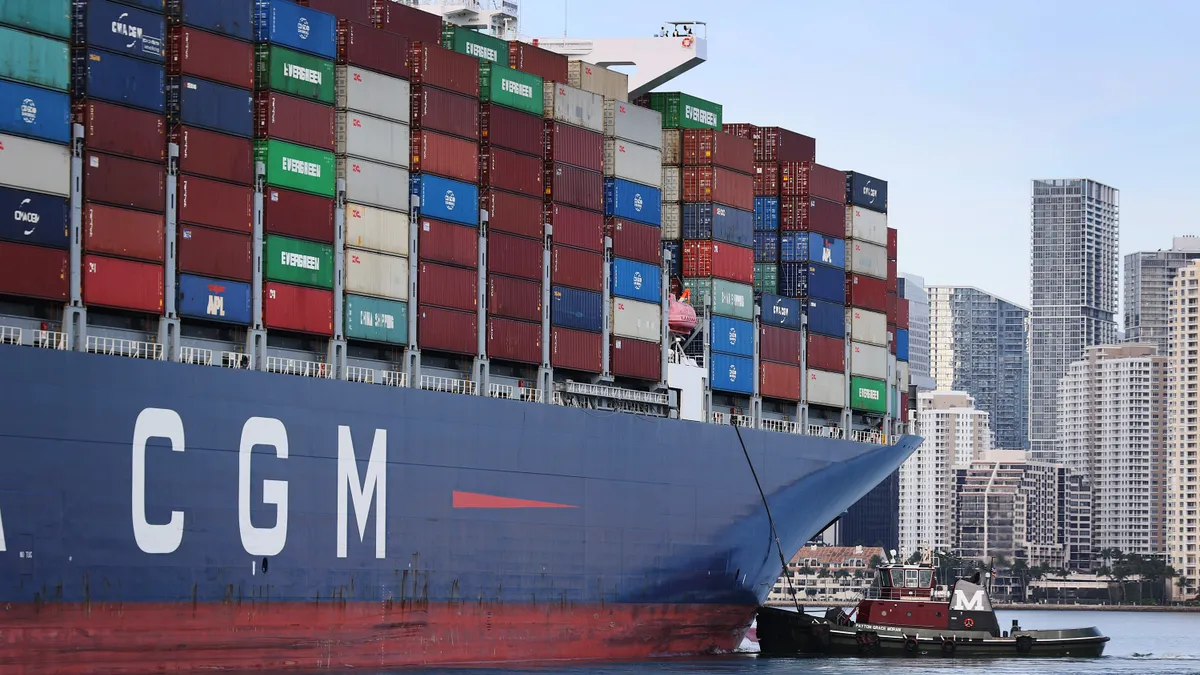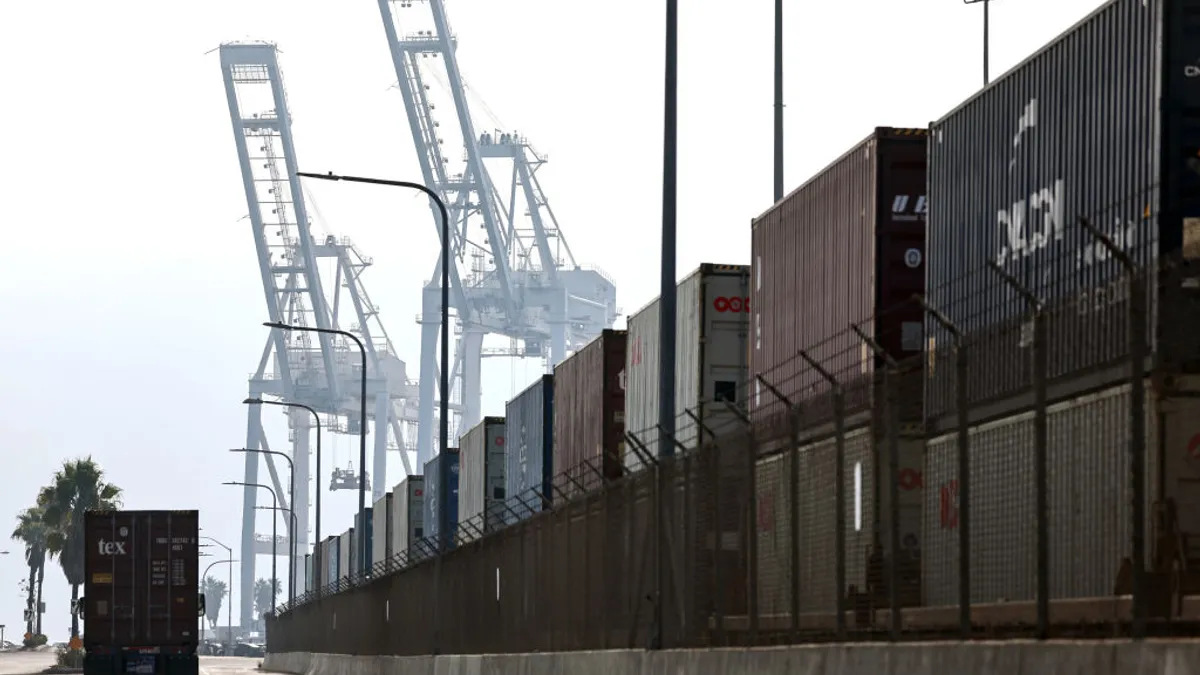Hurricane Beryl made landfall in Texas early Monday morning as a Category 1 hurricane, devastating coastal community Matagorda, Texas — roughly 100 miles from Houston — with nearly 80 mph winds, according to a USA Today tracker, updated July 10.
The storm knocked out power for more than 2.5 million homes in Texas, flooding highways and leaving fallen trees and other debris in its wake, impacting lives, businesses and, consequently, logistics operations.
Although Beryl has since weakened to a tropical depression, its initial impact created delays for all freight modes. Here’s what supply chain managers should know as the storm’s remnants move north. .
Maritime shipping
On a DAT weekly market update, Paul Brashier, VP of ITS Logistics, said the storm disrupted Texas ports early in the week. Since then, multiple ports reported normal operations, with recovery efforts underway, he added.
Initially, the Ports of Brownsville, Corpus Christi and Galveston — which handle cargo like crude oil — shut down on Sunday but resumed normal operations after the storm’s passing on Monday, Scott Hoffmann, VP of North American surface transportation at C.H. Robinson Worldwide, told Supply Chain Dive in an email.
The Port of Houston faced a more significant impact from Beryl and remained closed Tuesday to assess the damage and make necessary repairs, Hoffman said. Starting Wednesday, the port announced longer gate hours to get containers moving.
Hoffmann added that C.H. Robinson brings freight into Houston from Latin America, Europe and Asia on behalf of oil and gas companies and retailer clients.
The Houston Ship Channel is a 52-mile federal waterway that services eight public and more than 200 private terminals, a Houston Port spokesperson told Supply Chain Dive in an email.
Currently, power outages and facility damages have had the biggest impact on port operations. The spokesperson added that the port’s eight public terminals “fared OK,” with slight impact to its systems.
“Port Houston eight public facilities will resume operations this evening for vessel operations and on Wednesday morning returned to normal start times for gate operations, offering extended hours at the container terminals just 2 days after storm landfall, with total closure of the public terminals limited to only three days,” the spokesperson said.
Air cargo
Roughly 1,700 flights were canceled on Monday at both George Bush Intercontinental Airport (IAH) and William P. Hobby Airport (HOU), disrupting domestic air cargo, Hoffmann said in an email. Cargo hubs also shut down on Monday.
Based on 2023 airport data, IAH handled around 523,569 tonnes of air cargo, while HOU processed 10,559 tonnes last year.
Although en route flights delayed by the storm have since resumed, carriers are navigating cargo backlog from the shutdown, Hoffman added.
“Many inbound flights from overseas have already landed or are en route and scheduled to arrive as planned,” he said. “We were prepared to divert to other airports such as Dallas or Atlanta and truck air freight from there, but it hasn’t been necessary. Things are pretty much back to normal for our international air operations.”
Last mile
On Wednesday, FedEx reported that Beryl caused “hazardous conditions” in Southeast Texas, particularly in the Houston area, with ongoing delays expected for inbound and outbound shipments in the region. FedEx listed 285 impacted ZIP codes, primarily in the Houston area.
UPS, meanwhile, also confirmed in a service alert that operations in the Houston region are expecting delays, noting that “UPS facilities will provide pickup and delivery services as conditions permit.”
The Houston UPS air freight office was operating without electricity with minimum available service on Tuesday. UPS said that operations were expected to resume Wednesday.
Trucking
Winds, flooding and debris due to the storm tightened truckload capacity in Gulf Coast markets, especially for van and flatbed freight, Dean Croke, principal analyst at DAT iQ, told Supply Chain Dive in an email.
Hoffmann said some truckload carriers continued to operate in the Houston region during the storm, although those with loads routed to impacted areas halted transport. He added that less-than-truckload shipments coming to and from South Texas can still expect delays. Power outages have also kept many shipper facilities closed, creating further backlog.
“LTL terminals could close if flooding prevents workers or drivers from getting there,” he said in an email as the situation was developing Sunday. “Power outages can also prevent terminals from processing paperwork.”
Despite the storm avoiding the border crossing at Laredo, Texas, auto parts and other freight destined for the U.S. and Canada from northeastern Mexico could expect delays due to flooding, he said at the time. The shipment of produce like limes, mangoes and avocados from Mexico could also get delayed, Hoffman said, adding that C.H. Robinson will be “ready to route loads around the storm if needed.”
By Tuesday, several LTL terminals had indeed closed, but Beryl moved away from the parts of Texas where that freight normally travels.
"Now that [LTL terminals] reopened, delays can be expected to continue for shipments into or out of the Gulf Coast region of Texas until terminals are able to work through backlogs," Hoffmann said in a later update.
Rail
Railroads BNSF and United Pacific initially shuttered or delayed operations due to Beryl but have slowly resumed operations in the areas affected by the storm.
BNSF’s Pearland Intermodal Facility is now open for ingates and pickups, with train flows resuming through its Houston complex, according to a update on Tuesday. The railroad said its teams are currently working through the cargo backlog and advised customers to expect lingering delays.
“Prompt unit pickup is encouraged at Pearland to improve traffic flows, reduce lot congestion and provide space needed to process inbound freight quickly as operations continue to normalize following Hurricane Beryl,” BNSF said in the update.
Union Pacific, meanwhile, said in an announcemen on Tuesday that all impacted track segments had been restored, except for those in the Galveston area.
However, the loss of power has impacted Union Pacific’s signal systems and train fluidity, a spokesperson told Supply Chain Dive in an email. “As a result, some delays should be expected for rail shipments moving through the impacted area,” they added.
Trains on tracks jointly operated by CPKC and Union Pacific on railroads in the Brownsville area have also resumed operating, Hoffmann said
Editor's note: This story was updated with additional details from C.H. Robinson, and to clarify the timeline of statements from Hoffman.




















